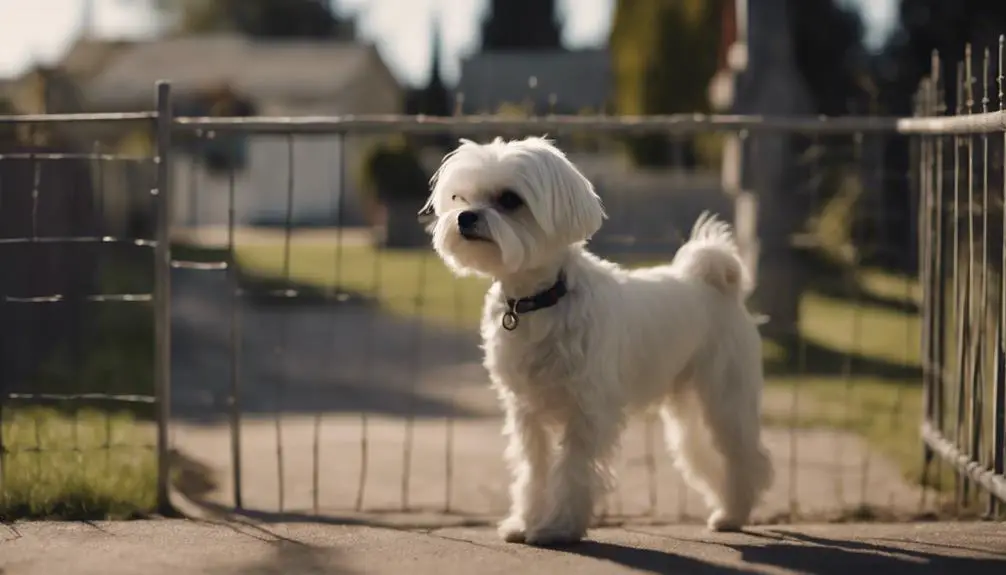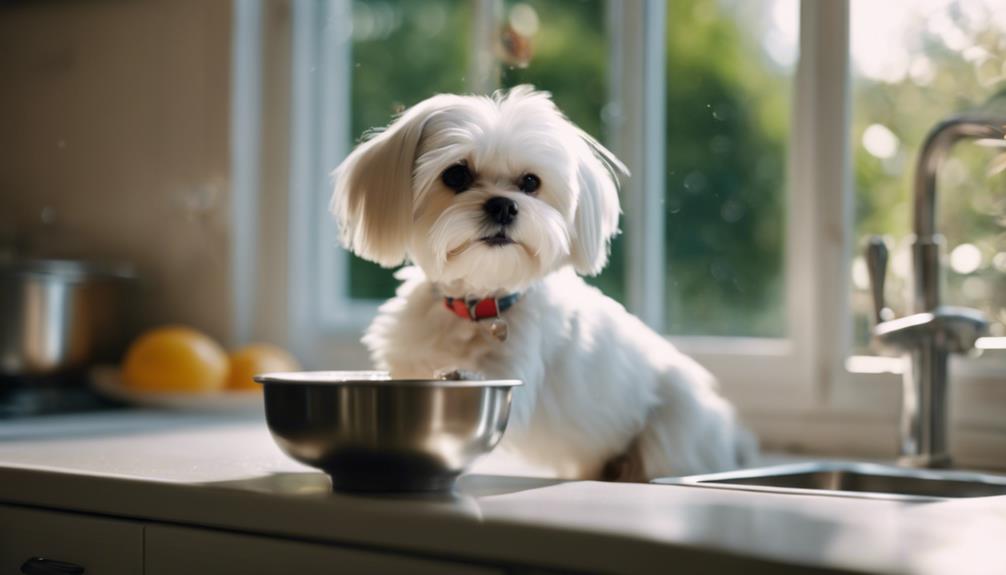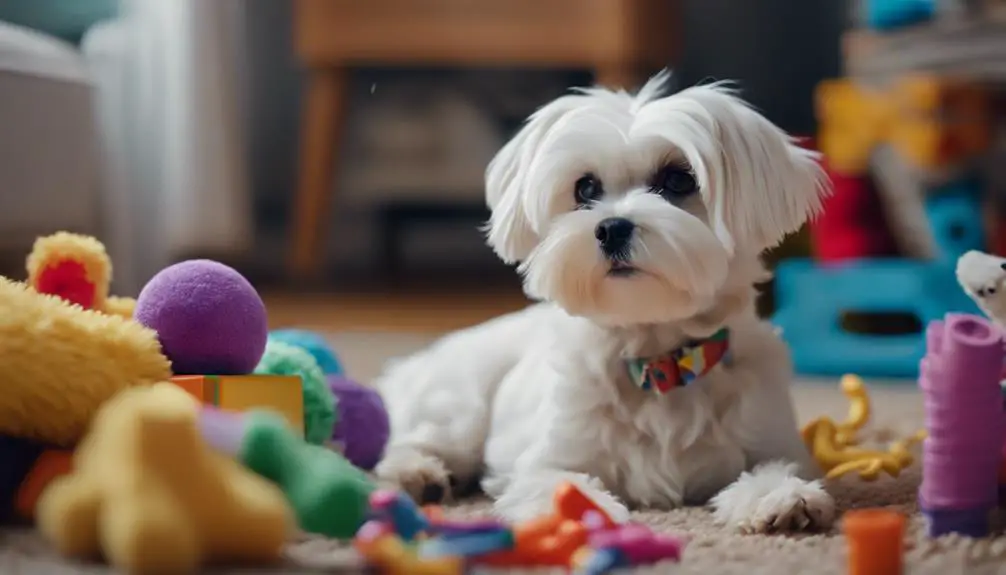If you've ever wondered why your Maltese follows you from room to room, or why they seem to bark at every passerby, you're not alone. These behaviors, while sometimes perplexing, have deep roots in the breed's history and natural instincts. For instance, their tendency to stick close to their owners stems from centuries of breeding as companion dogs, aimed at creating loyal, attentive pets. Understanding these common behaviors not only provides insight into your dog's psyche but also enhances your ability to communicate effectively with them. Let's explore what drives these actions and how you can respond to guarantee a happy, well-adjusted companion. What might seem like quirky habits are often expressions of deeper needs.
Following You Everywhere

You might notice that your Maltese follows you everywhere, a behavior rooted in their strong bond with their owners. This adorable trait reflects their history as companion dogs, bred to keep close to their human friends. When your Maltese shadows you, it's not just a sign of affection but also of their dependence on your presence for comfort and security.
If you're working in your home office or cooking in the kitchen, you'll often find your furry friend right by your side or at your feet. This can sometimes lead to tripping hazards, so it's wise to keep an eye on where they are, especially if you're moving around a lot.
Interestingly, this following behavior isn't just about companionship. It's also a way for your Maltese to satisfy their curiosity. As you move from room to room, you're changing their environment, which keeps things interesting for them. They love to explore new spaces, even if it's just the different corners of your home.
To manage this clinginess, it's helpful to provide them with toys or a cozy sleeping area where they can stay comfortably while you're busy. This encourages a bit of independence while ensuring they still feel secure and loved.
Barking at Strangers

When a stranger approaches, your Maltese will likely start barking, signaling their protective instinct. This behavior isn't just about making noise; it's rooted in their nature as alert and vigilant dogs. Your Maltese's sharp barks serve as a first line of defense, intending to alert you and potentially scare off intruders.
You might find this behavior challenging, especially if you live in a busy neighborhood where strangers often pass by. But remember, your Maltese doesn't grasp the difference between a benign visitor and a potential threat. They're simply reacting to unfamiliar faces or scents.
To manage this instinctual barking, consistent training is crucial. You can start by introducing your Maltese to various people in controlled settings. Reward them for calm behavior and gently correct them when they bark unnecessarily. Over time, they'll learn that not every stranger is a threat, reducing their need to bark.
Additionally, make sure your Maltese gets plenty of social interaction and exercise. A well-exercised dog is generally more relaxed and less prone to excessive barking.
With patience and consistent training, you'll help your Maltese distinguish between normal comings and goings and actual alerts, making life quieter and more peaceful for both of you.
Spinning Before Meals

Often, your Maltese might spin excitedly before meals, signaling their anticipation for food. This twirling isn't just cute; it's a display of their natural enthusiasm and keenness to eat. Understanding why your furry friend behaves this way can help you connect with them on a deeper level.
This behavior stems from their instinctual excitement and perhaps a bit of anxiety about mealtime. It's similar to how they might race around when they're happy or excited about other things. Spinning can also be a way for your Maltese to burn off some energy before they settle down to eat.
If you notice that the spinning seems excessive, it might be a good idea to check if their feeding schedule is consistent or if the portions are appropriate, as they might be overly hungry.
To manage this behavior, you can help your Maltese calm down before meals by providing a quiet, distraction-free environment. Establishing a predictable routine around meal times can also reduce their anxiety. Over time, your Maltese may spin less as they feel more secure about when and how they'll receive their food.
Always make sure the spinning doesn't evolve into a compulsive habit, as this could indicate stress or anxiety that might need addressing.
Sleeping in Tight Spaces

While your Maltese shows excitement through spinning, they also seek comfort by sleeping in tight spaces. You might find them snuggled between cushions or nestled in a pile of laundry. This behavior isn't just cute; it's instinctual. Dogs, descended from wild ancestors, often seek sheltered spots that offer protection and warmth. For your Maltese, a tight space mimics these secure environments.
You might notice this tendency increases during colder months or when there's a lot of household activity. It's their way of finding safety and comfort when the environment feels overwhelming or chilly. Additionally, sleeping curled up in a snug spot can help preserve body heat and allows them to manage their temperature better.
To support this natural inclination, you can provide a cozy bed or a box with soft blankets in a quiet corner. Watch how they'll gravitate towards it, especially after a busy day or during noisy events at home. This isn't just about comfort; it's about creating a safe haven where your Maltese can relax fully.
Understanding and accommodating these instincts helps your Maltese feel secure and loved, reinforcing a positive, stress-free environment at home.
Frequent Licking

Your Maltese's frequent licking can signal various emotions, from affection to anxiety. This behavior isn't just a random habit; it's a way for your pup to communicate. When your Maltese licks you, it's often a sign of love or a request for attention. They're saying, 'Hey, I'm here, and I adore you!' But, if the licking seems excessive, it could be a sign of underlying stress or discomfort.
You might notice your Maltese licking their paws or objects around the house. This can be due to boredom or a self-soothing technique to cope with anxiety. It's important to observe the context in which this behavior occurs. Is it during thunderstorms or when you're away? This can help you identify triggers and address them appropriately.
To manage and reduce unwanted licking, make sure your Maltese has plenty of physical and mental stimulation. Regular exercise and interactive toys can work wonders. Also, consider training sessions that reinforce calm behaviors and provide structured ways for your Maltese to seek attention positively.
If the behavior persists or you notice any skin irritations or digestive issues, consulting a vet is wise. They can help rule out any health problems contributing to the excessive licking.
Obsessive Tail Chasing

If you notice your Maltese chasing their tail obsessively, it may be a sign of behavioral issues that need addressing. This behavior can stem from various factors including boredom, anxiety, or even a medical condition.
Let's break down what you can do to help curb this habit.
First, assess your dog's activity level. Maltese are energetic and require regular exercise. Without enough physical and mental stimulation, they might start displaying compulsive behaviors like tail chasing. Make sure you're providing daily walks, playtimes, and interactive toys to keep them engaged.
Next, consider the possibility of anxiety. Tail chasing can be a response to stress or nervousness. Reflect on any recent changes in your home environment that might be affecting your pet. It's important to maintain a stable, calm atmosphere.
If the problem persists, consult your veterinarian. Sometimes, tail chasing is linked to underlying health issues such as allergies or neurological disorders. A professional can conduct a thorough examination to rule out these possibilities.
Picky Eating Habits

Maltese dogs often develop picky eating habits, which can be frustrating for owners trying to guarantee a balanced diet. If you're facing this challenge, you're not alone. Understanding why your Maltese may be picky can help you find effective solutions.
Firstly, consider the size and taste preference of your Maltese. These small dogs have tiny mouths and may find large kibble uncomfortable to eat. They also have a discerning palate. Choosing high-quality, small-sized kibble or wet food that's rich in flavor might appeal more to your furry friend.
Moreover, consistency is key. If you've frequently switched foods hoping to find the magic formula that your Maltese loves, you might be inadvertently encouraging pickiness. Stick to one type of good-quality food, and be patient. It can take time for your Maltese to adjust.
Also, pay attention to mealtime atmosphere. Stress and distractions can lead to poor eating habits. Assure that feeding times are calm and quiet. Avoid giving table scraps or too many treats, as these can spoil their appetite for regular meals.
Lastly, if your Maltese's picky eating is accompanied by weight loss or lethargy, consult your vet. There could be underlying health issues needing attention.
Guarding Their Toys

While managing your Maltese's diet is important, you'll also need to address how they guard their toys. This behavior, often seen as a form of resource guarding, isn't uncommon in Maltese dogs. You might notice your furry friend becoming possessive, growling, or even snapping when someone approaches their prized possessions. Understanding this behavior is important to ensuring a harmonious home environment.
Firstly, it's critical to recognize that this isn't about dominance, but more about fear of losing something valuable. To address this, you'll need to teach your Maltese that giving up their toy can lead to something even better. Start by trading the toy with a treat or another toy, and always praise them when they let go willingly. This positive reinforcement helps them learn that sharing can be rewarding.
Moreover, avoid punishing your Maltese for guarding their toys. Negative reactions can exacerbate their anxiety, making the problem worse. Instead, focus on creating a trusting relationship where your Maltese feels secure. Regular training sessions where you gently handle their toys, coupled with treats and praise, can greatly help in reducing their guarding behavior.
Shivering or Trembling

You might notice your Maltese shivering or trembling, which can be due to various reasons ranging from excitement to discomfort. It's important to understand these cues to better cater to your furry friend's needs.
One common trigger for shivering is simply being cold. Maltese dogs have a single coat of hair rather than a double coat, which makes them more susceptible to chills. If you see your pup trembling, check the room temperature. Maybe it's time to turn up the heat or provide a cozy blanket.
Anxiety or fear can also cause your Maltese to shiver. This could stem from various sources like loud noises, new environments, or even unfamiliar people. Pay attention to when the trembling starts to identify the trigger. Once identified, you can help your pet by removing them from the stressful situation or by using calming techniques like soft music, pheromone diffusers, or consulting with a vet for more severe cases.
Lastly, shivering could indicate pain or illness. If the trembling is accompanied by other unusual behaviors like lethargy or loss of appetite, a vet visit is essential. Early detection and treatment can prevent more serious issues.
Demanding Attention

After addressing why your Maltese might tremble, let's explore how they seek your attention. You've probably noticed that your Maltese isn't shy about demanding your focus. Whether it's playful barking when you're on the phone or nudging your hand while you work, they know exactly how to make their presence felt.
Your Maltese may sit in front of you, staring intently with those big, soulful eyes. Don't be surprised if they start pawing at you or placing their head on your lap. It's their way of saying, “Hey, I'm here, and I need some love!” Ignoring them isn't an option they accept lightly; they might persist until you give in.
They also might resort to antics like fetching a toy and dropping it at your feet, a clear invitation to play. If you're late on their routine walks or meals, expect them to remind you with more insistent whining or even a few playful nips.
Understanding this behavior is essential. It's not just about seeking attention; it's about communication and interaction. By responding to their needs, you're strengthening your bond and ensuring your Maltese feels as cherished as they cherish you.
Conclusion
Understanding your Maltese's unique behaviors strengthens your bond. When they follow you, bark, or spin, they're expressing their innate traits and emotions.
Create a stable environment with regular exercise and positive reinforcement to address behaviors like guarding or obsessive actions. Recognize their quirks, from picky eating to seeking cozy spaces, as part of their charm.
By tuning into their needs and showing patience, you'll guarantee a harmonious and loving relationship with your delightful Maltese companion.


